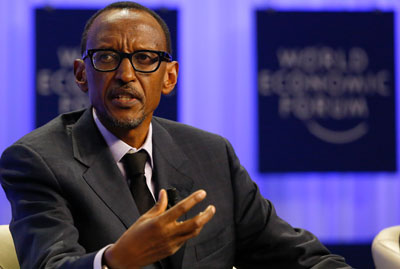“@RFI speak straight up English, frenchie!! U crying? U started not to make sense,” was one taunting tweet from a certain prolific Twitter account belonging to “Richard Goldston.” The account, since deleted, belonging to a self-proclaimed “anti-imperialist,” repeatedly antagonized Radio France Internationale journalist Sonia Rolley for her critical coverage of the deaths of Rwandan government officials-turned-dissidents.
When Rolley tweeted about the killing of former Rwandan spy chief Col. Patrick Karegeya in South Africa in January, indicating her suspicion of Rwandan government involvement, several Rwandan Twitter accounts, including that of “Goldston,” tried to discredit Rolley, claiming (without evidence) that she was romantically linked to the former spy chief. “Goldston” routinely criticized the South African government, even referring to President Jacob Zuma as “a black retard” as relations soured. The South African government recently expelled Rwandan diplomats on suspicion of attempted assassination of another former top Rwandan official-turned-dissident, Gen. Kayumba Nyamwasa.
Meanwhile, another foreign correspondent who covers Rwanda, Steve Terrill, shot back at “Goldston,” requesting an end to the stream of nasty tweets against Rolley.
On March 15, Rwandan immigration blocked Terrill from entering Kigali, Rwanda’s capital, to cover the 20th anniversary of the Rwandan genocide for Al-Jazeera and the Christian Science Monitor. “Immigration locked me up for a few hours and then forced me to sign some papers and get on a plane to Addis,” Terrill told me. He was not allowed to contact the U.S. Embassy and no reason was provided for the expulsion.
The blocked entry is likely linked to Terrill’s discovery about “Goldston.” Terrill maintains that the Rwandan government uses at least a dozen false Twitter accounts to counter its critics. These accounts dominated the Twitter discussion about the Karegeya affair, defending the Rwandan regime at every turn, he said. Terrill also believes some pro-government Rwandan news websites are creations from within Kigali’s state house–replete with fake staff listings so that Google News and news aggregation site AllAfrica pick up their content.
Terrill said he contacted then-Communications Director Yolande Makolo in late January, warning her that he had identified the individual in the president’s office who was responsible for Goldston’s tweets and suggesting they take his account down. “My concern is that if this were to continue, especially if the most offensive material targeting reporters continued […] it may become a story,” he told her, according to his blog.
President Paul Kagame’s office tweeted earlier this month: “@RichardGoldston was an unauthorized account run by an employee in the Presidency. It has been deleted and the staff member reprimanded,” according to news reports.
Terrill is resigned to the fact that he may never again be allowed into Rwanda, which he considers a second home. He has worked in Rwanda for five years as a correspondent for news outlets including Agence France-Presse and Voice of America. “Without sounding too melodramatic, Rwanda is my favorite place in the world. I feel as if my life is there, so it’s heartbreaking,” he said.
Tellingly, the “Twitter-Gate” story has made the rounds in the international press but hardly surfaced in Kigali, Terrill and local Rwandan journalists told me. Some local media houses did report the incident, said Fred Muvunyi, the chairperson for the Rwanda Media Commission, a new self-regulating body, but most cited the foreign press and social media networks. “Self-censorship is still there; but there’s progress so far and we are encouraging journalists to test the new opportunities given by new media laws,” Muvunyi said. Rwanda passed a media law last year that introduced a self-regulating body for the press.
To be sure, Rwanda is not the only East African country accused of using false social media accounts to push government agendas. But what makes Rwanda’s “Goldston” example so pernicious is the level at which the Rwandan government uses the media, both locally and regionally, to portray a positive image and silence its detractors. At least two Ugandan and one Kenya-based news publication that routinely portray Kigali in a positive light are directly funded by the Rwandan ruling party, local journalists with knowledge of the publications told me. They asked not to be identified for fear of reprisal.
At the same time, Rwandan intelligence agents directly threaten local and foreign journalists into silence. Andrew Muhanguzi, the brother of critical exiled Rwandan Umuvuguzi news website editor, John-Bosco Gasasira, has been missing since February 16, after having been detained in Kampala by men claiming to be Ugandan police officers. Ugandan police have denied any involvement, local journalists told me. Suspected Rwandan agents have routinely followed and even attempted to raid the home of former Uganda Radio Network journalist Tom Malaba for his reporting on the plight of Rwandan refugees in Uganda, he told me. “When the Rwandan government cannot bribe journalists, they use intimidation,” Malaba told me. “Overall these tactics are affecting journalism standards–not just in Rwanda but the East African region.”
